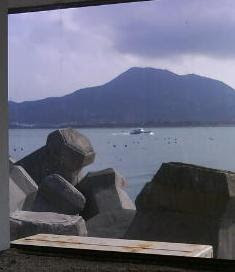‘Scientists say Fukushima cause of mutant butterflies’
symbols of imperial office, not the person
as in 1881 song No. 17, sung to ‘Lightly Row’ and ‘
Hänschen Klein,’
‘Butterflies, butterflies, stop on the rappini,
if you tire of rappini blossoms, move on to the cherry
as half lives round down over time
bob up and down in any weather
and stay in the cherries in the glorious reign
stay and play, stay a moment to play’
hide-and-seek, categorically
spring—
eluding seasons in any weather
wings flop the butterfly and drop.
Time to change the soil on land and shore,
as time marches forward
pushing celestial light, holding
changing the soil and water of the earth
to carry on as if again as if
the bottom will fall through as if
again, in magic puffs butterflies rise
again in lovely songs and multitudinous--
modern, blown by the wind
quietly mutating what shadows and stays,
waiting for a voice to say
we are real stillno longer sewn to our hiding as one
under a great hand or song.
Who would trade the earth, air and water
for the solvency of a few, a handful of expedience?
If we cannot plant our spinach and tomatoes
we’ll read by kerosene. What refugees in the Northeast
would turn to turn their cesium to the poisoned earth,
would dare blame themselves than speak out
gathering a new category of butterfly and spring?
Note: Reading many “current events senryū” (satirical haiku on social themes) from the major newspapers in Japan (Asahi shinbun, Mainichi shinbun, and Yomiuri shinbun), following the sentiments expressed in the verse I became quite disturbed by what appeared in the news and poetry to be a joint corporate-government stonewalling as well as deadly ineptitude in the handling the nuclear crisis. Given how neoliberalism renders new norms of thinking by which it offers amoral and by common standards unethical parameters of judgment—based purely on values expressed in mottos such as “profits are all that matters” which is justified by “the free market forces solve all problems” with leads to privatization and the shift from a democracy to a corporate oligarchy—such corporate-government indifference even to human lives is not totally unexpected, though still shocking. Obviously, the expense of shoring up the Fukushima reactors, known to be threatened by tsumani, was deemed unprofitable, and the delusional fiction propagated by nuclear energy companies seems to have led in the case of TEPCO to an actual belief in their own propaganda that there could be no problem, no contingencies for worst-case scenarios, even after 3/11. Of course planning for non-profitable contingencies such as tsunami, which are not uncommon, was not their only mistake. Information about radioactivity was kept from the public as if they were expendable. As Alain Badiou (whose work inspired this poem) might argue: the people of Japan are now inexistants when confronted with the nuclear power corporations alliance with governments in Japan. Of course, to assert their existence as Japanese is possible (as in the recent weekly demonstrations): continue the categorical play and enjoy losing oneself in the alignment of fashion discourse and the latest gadgetry with being a consumer, or to stand up for the people of not only Fukushima but Japan as a whole, and follow as Germany (but with even better reasons) a non-nuclear power policy to match the non-nuclear proliferation policy. I have lived in Japan many years in the past, and still feel it is my second home after Taiwan. This issue seems very important (enough to wake me from my blogmatic slumbers).






















